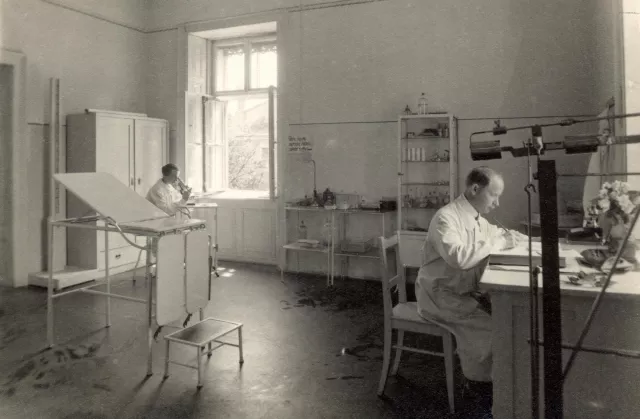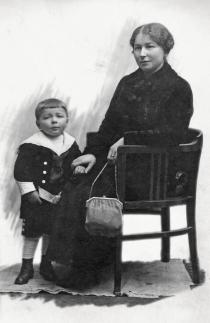This is my dad in his surgery at the Masaryk Institute for Social Work in Kutna Hora.
My dad was born in 1892 in Cimelice. While studying medicine, he become involved in student activity against Austria and was sentenced to six months at the age of twenty-two.
He was only in prison for three years though, because there was an amnesty in 1917 when Emperor Franz Joseph died and a new emperor came along. Dad was condemned and permanently expelled from all the universities in Austria-Hungary.
My grandfather Vilem wrote a letter to a prison in Arad, Romania , asking if his son Julius was there and if he was alive and well. He received the letter back with the following note written on it in German: "We can inform you that your son Julius is here and is well."
A lawyer later explained to me that this made sense because if they had replied on different paper, they would have had to archive it and to send an official reply.
After my father had received an amnesty, he later served in the army in a Czech regiment in Hungary, and in 1918 resumed his studies once again.
He would often relate what happened when he went to put his name down for the degree ceremony: a clerk at the rector's office looked in his documents and pointed out that he had been permanently expelled from all universities in Austria-Hungary.
In response, dad said that Austria-Hungary is no longer in existence. He was a general practitioner all his life.
Dad had been given a position in Kutna Hora as a doctor at the Masaryk Institute for Social Work, as well as setting up his own practice.
This is apparently how they met, according to the family. But in fact, they actually met, I think, through a joint friend of Mr. Ohrenstein, the father of the poet Orten.
I think that dad was a good doctor. There are still people around who can remember him. He employed nurse at the Masaryk Institute for Social Work, but he did everything for himself at home.
Mom came in the evening to clean his instruments and to boil the syringes. He was the only Jewish doctor in Kutna Hora. Because he was a Jew, he was allowed to work as a general practitioner only until 1939, after which time he could treat only Jewish patients.
Dad was a member of a number of professional associations, but I don't think he held any posts in them. He was a retired officer and saw himself as a Czechoslovak patriot. His political sympathies were with the Social Democrats.
At home we read 'Pravo lidu' , which was a Czech-language daily paper read by the majority of Social Democrats.






























